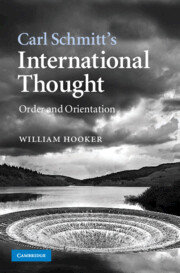Book contents
- Frontmatter
- Contents
- Preface
- Chronology of Schmitt's life
- 1 Introduction
- 2 Schmitt's ‘international thought’
- 3 Unravelling sovereignty
- 4 Histories of space
- 5 Acceleration and restraint
- 6 Großraum
- 7 Partisan
- 8 Conclusion
- Appendix. Carl Schmitt in international relations: a bibliographic essay
- Bibliography
- Index
3 - Unravelling sovereignty
Published online by Cambridge University Press: 29 March 2010
- Frontmatter
- Contents
- Preface
- Chronology of Schmitt's life
- 1 Introduction
- 2 Schmitt's ‘international thought’
- 3 Unravelling sovereignty
- 4 Histories of space
- 5 Acceleration and restraint
- 6 Großraum
- 7 Partisan
- 8 Conclusion
- Appendix. Carl Schmitt in international relations: a bibliographic essay
- Bibliography
- Index
Summary
Do not concern yourself: the Leviathan – its shadow is long – therefore the Leviathan is already concerned for me. It already holds an honoured place in the barbed wire Prytaneum waiting for me. There it will sustain me with food and drink befitting of the place.
Carl SchmittThe isolation of stable concepts of power and authority are the hallmarks of Schmitt's theoretical method. As the previous chapter makes clear, the dominant starting point for all of Schmitt's political thinking is the state, and its specific, defining attribute, sovereignty. All of Schmitt's early work was directly or indirectly concerned with accurately defining the state, and making clear the relationship between the state and the political. In theoretical terms, Schmitt rests on a definition of sovereignty as the power to decide on the exception – the pure capacity to impose a coherent ordering decision at the point at which law ends. To act politically is to define enemies. To exercise sovereignty is to decide on the exception. These are the twin poles of Schmitt's familiar, ideal theory of politics in the state.
This lean set of definitions that Schmitt worked out in the 1920s and early 1930s undoubtedly remains as his most distinctive contribution to subsequent political theory. By isolating out the essence of political authority, Schmitt created a powerful descriptive and analytical tool with which to criticise political reality.
- Type
- Chapter
- Information
- Carl Schmitt's International ThoughtOrder and Orientation, pp. 34 - 68Publisher: Cambridge University PressPrint publication year: 2009



